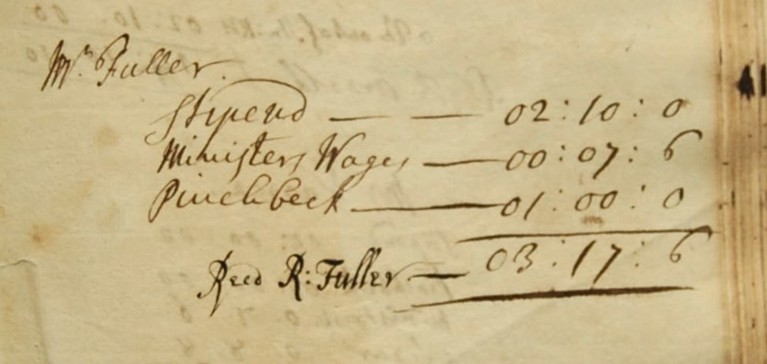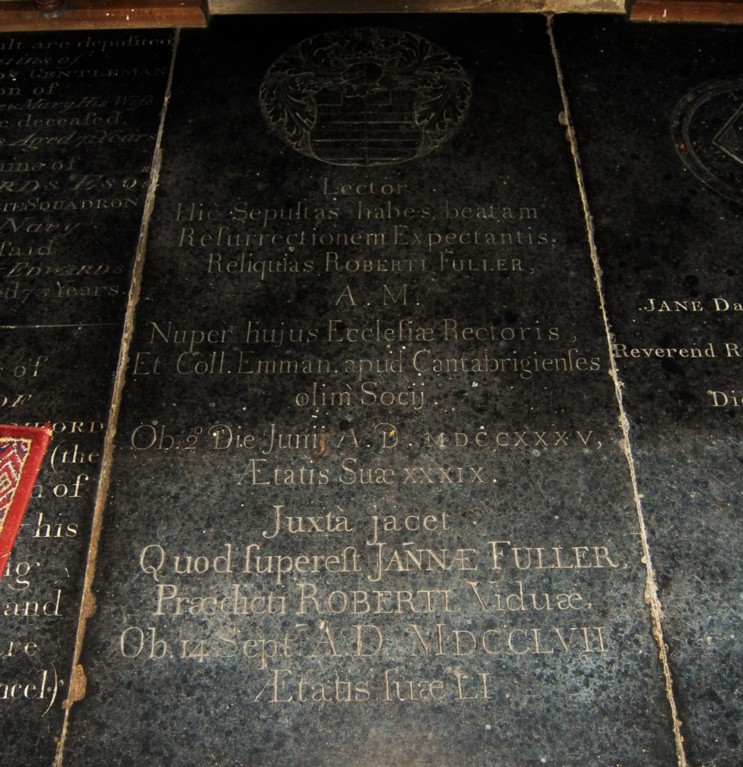Blog
30 November 2023

Robert Fuller signs for his final salary payment, October 1727
Emmanuel is almost unique among Cambridge colleges in having in its archives a disciplinary, or ‘admonition’ book, dating from the earliest days of the college. Most of the miscreants who feature in it are students, but two entries involve a college Fellow, the Revd Robert Fuller.
A native of King’s Lynn, Fuller was a graduate and, from 1719, Fellow of Emmanuel. He was ordained four years later. The first intimation of his contrariness is an entry in the admonition book dated 24th August 1725: Mr Fuller, Sen[ior] Fellow, & Dean of the College was Admonish’d by the Master in the presence of all the Fellows then in College for great offences that he was guilty of’. While it is startling to see a formal censure being applied to a member of the fellowship, the fact that Fuller was also dean does not exacerbate the scandal, as the office was held in annual rotation by Fellows who were in holy orders.
What might Fuller’s unspecified offences have been? He was frequently absent from college, as the exeat book attests, although his trips were generally of short duration. In the early years of his fellowship he preached regularly at Holy Communion services in Emmanuel’s chapel, but ceased to do so in May 1725 - doubtless evidence of a deteriorating situation. In February 1726, six months after Fuller’s first admonition, the college passed an order that ‘whoever misses his turn of visiting as appointed by the Dean shall forfeit the sum of five shillings to be deducted out of his stipend… and applied to the use of the Poors Bag’. Two months later, Fuller was fined under the terms of this somewhat opaque order.
Matters finally came to a head on 11 November 1726, when Fuller was summoned to ‘appear before the Master & Senior Fellows & Dean, and the Master proceeded to Admonish him for his irregular behavior & notorious neglect of duty. Upon this Admonition, he behav’d himself in a very insolent outrageous manner: & upon the Master’s testimony that he admonished him according to the direction of the statutes; he reply’d A fart for your Admonition & used other contemptuous language’.
Following this unedifying scene, Fuller appears to have gone out of residence almost immediately. The college statutes laid down that a Fellow could be deprived of his office after two (unheeded) admonitions, but in the event Fuller jumped before he could be pushed. A curt entry in the exeat book records that in June 1727 his name was ‘cut out’, a marginal note adding: ‘Marry’d June 11th 1727’. As Fellowships were forfeited upon marriage, Fuller’s college career was thus abruptly terminated. He returned to Emmanuel to collect his final instalment of wages at the Michaelmas 1727 audit, and doubtless never set foot in the place again.
 Robert Fuller’s armigerous gravestone
Robert Fuller’s armigerous gravestone
What Fuller did for the next few years is unknown, but in June 1732 he was appointed Rector of Water Newton, Huntingdonshire. He died there some three years later, aged 39, and was buried in the chancel of the church. His gravestone records that he was formerly a Fellow of Emmanuel. Jane, his widow, shares his grave, and their daughter and ‘heiress’ Jane, who died in 1805, lies next to them. There are also nearby memorials to two other probable daughters of Robert and Jane: Easter Fuller (d.1759) and Mary Edwards, nee Fuller (d. 1801). It is to be hoped that the Revd Robert conducted himself in a more seemly fashion at Water Newton than was the case at Emmanuel – although it would be fascinating to know his side of the story!
Amanda Goode, College Archivist
